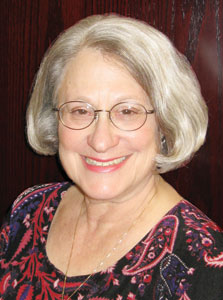 As SAFEHOME’s volunteer manager and Jewish outreach coordinator, I would like to thank the Flo Harris Foundation for funding SAFEHOME’s Jewish Outreach Program this past year. This money, and the foundation’s foresight in understanding the importance of this project, helps SAFEHOME save lives. It helps people survive and overcome domestic abuse, one of those topics that no one wants to talk about publicly. It is so important people understand that tragedies result from domestic violence. It’s even more important for me to emphasize these things can and do happen in the Jewish community.
As SAFEHOME’s volunteer manager and Jewish outreach coordinator, I would like to thank the Flo Harris Foundation for funding SAFEHOME’s Jewish Outreach Program this past year. This money, and the foundation’s foresight in understanding the importance of this project, helps SAFEHOME save lives. It helps people survive and overcome domestic abuse, one of those topics that no one wants to talk about publicly. It is so important people understand that tragedies result from domestic violence. It’s even more important for me to emphasize these things can and do happen in the Jewish community.
Here’s just one example. On Oct. 27, 2011, The Chronicle published a small article about a murder-suicide that took place on Oct. 18 in Lewisboro, N.Y., a small town in upscale Westchester County. Sam Friedlander killed his wife Amy, his children Gregory and Molly, and then he killed himself.
This horrible incident resonated with me on a number of levels. First, it took place during the Jewish High Holiday season.Second, Westchester County and Johnson County share a similar profile. Third, it affected me because of the amount of outreach I do through SAFEHOME in our own Jewish community. Fourth, it appeared after The Chronicle published an article by Jewish Women’s International regarding the High Holidays and National Domestic Violence Awareness Month both being in October.
Even after such an incident occurs, I’ve discovered people don’t want to talk about domestic violence or even use the label “domestic violence.” Such is the case with the Friedlanders. No one ever used the term domestic violence regarding the Friedlanders, yet descriptive words relating to domestic violence —such as controlling — were used often. Some articles also pointed to past trouble in the relationship when police were called to the home for domestic disturbances.
I tried, with no success, to discuss the Friedlanders with the newspaper reporter there. I wanted to know why domestic violence was never mentioned in any of the newspaper reports of the incident. If I could find references alluding to previous domestic situations, why couldn’t someone else?
I also contacted rabbis, cantors and agencies in New York City and the Westchester County area inquiring whether Jewish agencies do community outreach relating to domestic violence. Once again I hit a brick wall. Very few returned my calls or emails. Two people from Jewish agencies whom I successfully reached mentioned that the murders could have been related to domestic abuse, but the subject was too painful and no one really wanted to talk about it publicly.
Another person from a NY agency told me that domestic violence in the Jewish community was a hard topic for people to discuss. I agree that it’s a very difficult subject. But I’d rather discuss available services and resources for people in domestic violence situations than ways to honor the memory of two children after the fact.
Here in Johnson County a murder-suicide happened not far from Congregation Beth Shalom in January. The senior pastor of the couple’s church contacted me at SAFEHOME, asking me how to incorporate information regarding domestic violence into the eulogy. He wanted the eulogy to include an educational piece about community resources. This Overland Park tragedy also resulted in some of the church’s clergy visiting SAFEHOME to learn more about our services and to see the facility so they could speak knowledgeably during counseling sessions. I continue to feel frustrated and wonder why we have to experience a misfortune or death in order to put laws in place, or in this case, get the word out about available resources and services.
These incidents in Westchester County’s Jewish community and here in Overland Park cause incredible sadness. In the Jewish community, we can hope that the Friedlander legacy will be the knowledge that continued education regarding the prevention of domestic violence is important.
This brings me full circle back to my opening sentence, expressing SAFEHOME’s appreciation to the Flo Harris Foundation for funding the Jewish Outreach Program this past year. It enables SAFEHOME to save lives. We continue to hope others will see the importance of outreach programming, and choose to fund it in the future.
Susan Lebovitz, CVM, is volunteer manager and Jewish outreach coordinator for SAFEHOME. SAFEHOME’s mission is to break the cycle of domestic violence and partner abuse for victims and their children by providing shelter, advocacy, counseling and prevention education in our community.


